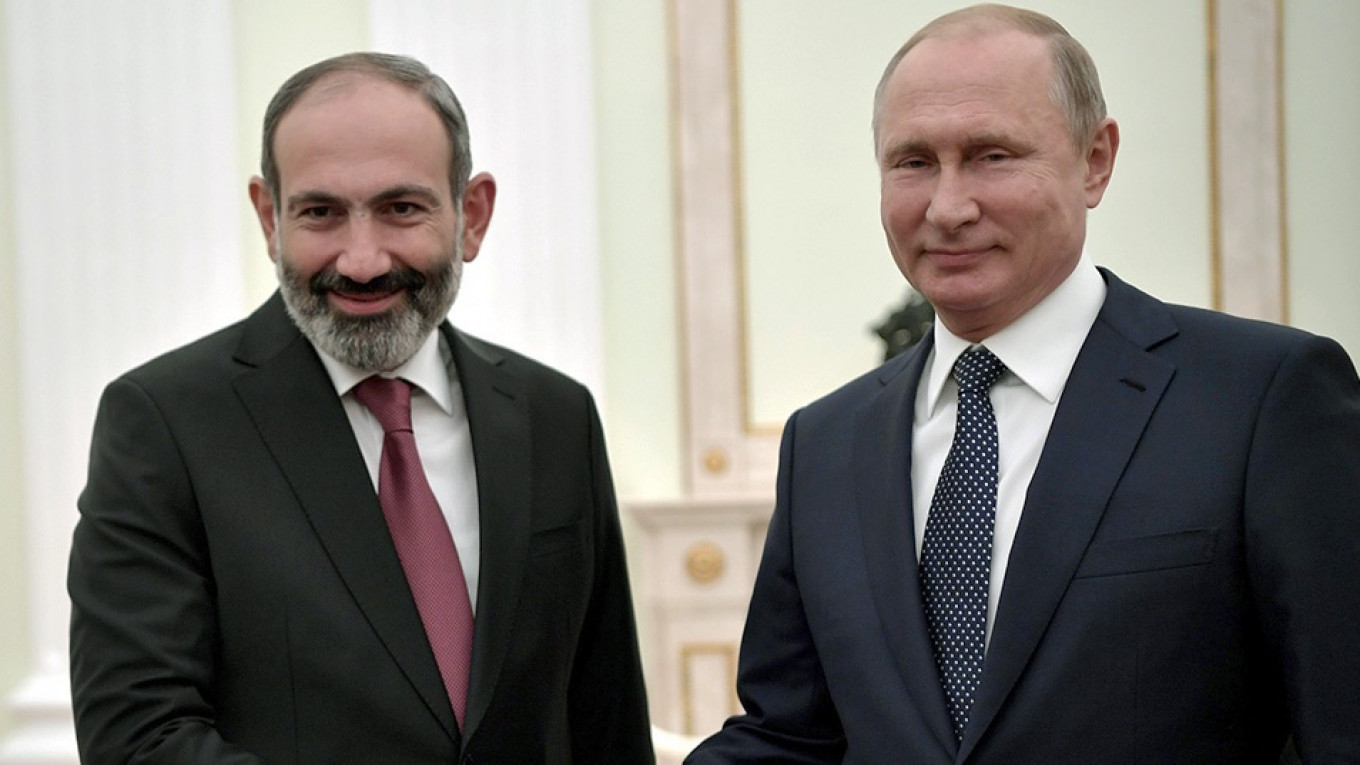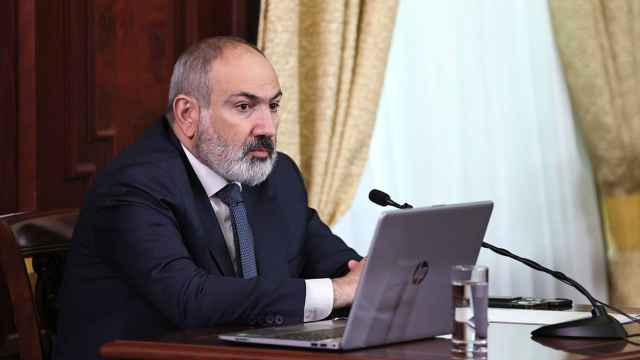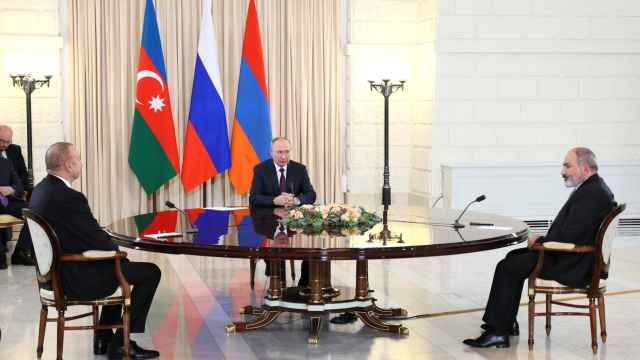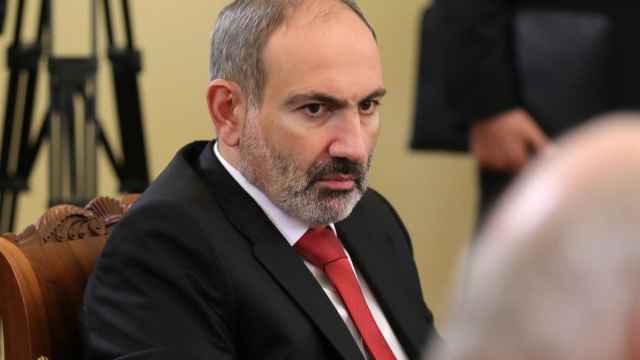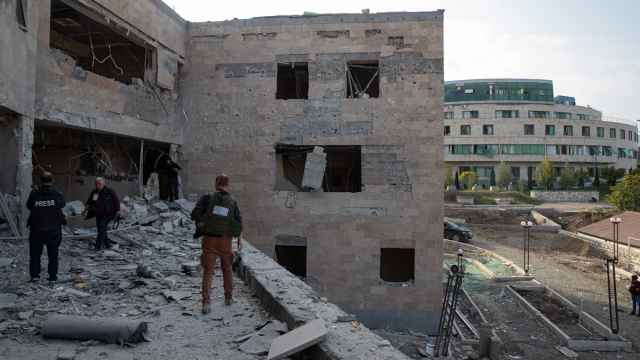When hundreds of thousands of Armenians took to the streets in April this year, ultimately forcing the country’s autocrat Serzh Sargsyan to step down, Russia didn’t intervene. Given the Kremlin’s hostile intervention in the midst of Ukraine’s revolution, Moscow’s neutrality went down well in Yerevan. The protest leader-turned-Prime Minister Nikol Pashinyan expressed gratitude for “Russia’s balanced position during Armenia’s internal political crisis.” And this Saturday, the two leaders are meeting in Moscow for the third time in just four months.
Since assuming office, Pashinyan has wanted to reiterate that Armenia has remained a loyal ally to Russia. But Moscow is skeptical. At a time when even allied autocracies like Belarus and Kazakhstan are diversifying their foreign policy away from Moscow, a young democrat, elected on an anti-corruption platform, isn’t the kind of leader Moscow would immediately trust.
In the wake of Sargsyan’s ouster, a crisis in the Russian-Armenian relations is inevitable, regional security analyst Eduard Abrahamyan told The Moscow Times.
“The Velvet Revolution is a new chapter in Armenia's history. It created the preconditions for the building of a new kind of state, one based on a systemic fight against corruption and bad governance,” said Abrahamyan. “Such a revolution couldn’t but make Moscow concerned.”
The tensions we’re seeing now are part of “a natural readjustment,” agreed Anahit Shirinyan, a Yerevan-based fellow at the Chatham House think tank. And “Russia doesn’t have the leverage over [Armenia] it used to have over the previous government.”
The first significant test for Moscow was brought about by the Pashinyan government’s legal campaign against the former regime. First, a high-profile member of parliament, two brothers and two nephews of ex-President Sargsyan, as well as his bodyguard and other senior figures, were charged with graft and illegal weapons procurement among other felonies.
Then in July, former President Robert Kocharyan was indicted by the Special Investigative Service. SIS, which reports to the prime minister, is investigating the deaths of 10 people killed amid the violent dispersal of anti-government protesters on March 1, 2008. Throughout his two presidential terms, Kocharyan was a reliable ally of Vladimir Putin and after leaving office served as a director for Sistema PJSFC, one of Russia’s largest investment companies.
Also charged with “usurping state power” was Yuri Khachaturov, the head of the Collective Security Treaty Organization, the Russia-led security bloc chaired by Armenia till 2020. Khachaturov was released on bail and returned to Moscow.
But the damage was done. In a statement, Russia’s Foreign Minister Sergei Lavrov hinted that the case against members of the former leadership was politically motivated and described it as a “cause for concern.” Last week, Lavrov stressed that Moscow expects Yerevan to contribute to “the strengthening of the reputation and prestige of our common [Collective Security Treaty] Organization.” Khachaturov’s indictment, presumably, did just the opposite.
In what could be seen as a gesture of moral support, the Kremlin’s website published Putin’s birthday greetings to Kocharyan. Last time a Russian president officially congratulated Kocharyan was in 2007 when he was still the Armenian president. He also received airtime on the Russia NTV network and Sputnik Armenia, both Russian state-controlled outlets.
Amind this crackdown, Pashinyan’s team is apparently looking for ways to smooth tensions. Last week, Armenia dropped out of upcoming NATO drill in Georgia. And the Hraparak newspaper reported that at the upcoming meeting with Putin, Pashinyan will pitch Moscow on humanitarian cooperation in Syria. Armenia has already been sending aid to Aleppo, but the new plan may include more ambitious provisions. A sense of what could be in the works was alluded to by Russia’s General Alexander Novikov, who said Armenia was committed to sending sappers to join the demining effort of the Russian-led coalition in Syria. Asked whether Syria is on the agenda of the upcoming meeting, Pashinyan’s spokesperson told The Moscow Times, “I can’t confirm these topics [to be on the agenda]”.
The deployment of Armenian troops in Syria, if it were to happen, would have a damaging effect on Armenia’s relation with the West, said Abrahamyan. “Such a move would effectively mean partially sharing responsibility with Russia for everything Russia has done in Syria.”
Whether Armenia joins Russia in Syria or not, issues preventing the Russian-Armenian alliance from being genuine lie far outside the Mediterranean. The two countries are allied within a military bloc and free-trade zone, CSTO and the Eurasian Economic Union respectively. Both organizations are largely dysfunctional and are seen in Yerevan exclusively as channels of communication with Moscow. These channels are critical given that over the past decade, Russia has sold Azerbaijan — Armenia’s archenemy — weapons worth more than $5 billion. “[Our] allies give our enemy a tool that is used exclusively for aggression,” Armen Grigoryan, Armenia's National Security Council secretary, wrote in June.
The strategic partnership between Moscow and Yerevan has inherent flaws, with Russia increasingly getting more out of it than Armenia, said Shirinyan. “This alliance is highly asymmetric. But if your point is not to anger Russia, the asymmetry in relations will continue.”
No matter who is in charge in Yerevan, it is Russia’s willingness to provide Baku with state of the art weaponry that could further push Armenia to look for other security partners.
Grigor Atanesian is a political commentator and journalist covering Armenia. He is a Fulbright scholar at The Missouri School of Journalism and a former Esquire Russia editor. The views and opinions expressed in opinion pieces do not necessarily reflect the position of The Moscow Times.
A Message from The Moscow Times:
Dear readers,
We are facing unprecedented challenges. Russia's Prosecutor General's Office has designated The Moscow Times as an "undesirable" organization, criminalizing our work and putting our staff at risk of prosecution. This follows our earlier unjust labeling as a "foreign agent."
These actions are direct attempts to silence independent journalism in Russia. The authorities claim our work "discredits the decisions of the Russian leadership." We see things differently: we strive to provide accurate, unbiased reporting on Russia.
We, the journalists of The Moscow Times, refuse to be silenced. But to continue our work, we need your help.
Your support, no matter how small, makes a world of difference. If you can, please support us monthly starting from just $2. It's quick to set up, and every contribution makes a significant impact.
By supporting The Moscow Times, you're defending open, independent journalism in the face of repression. Thank you for standing with us.
Remind me later.



